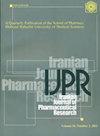Efficacy and Safety of A DOAC Compared to Unfractionated Heparin and A Low Molecular Weight Heparin in the Prevention of Thromboembolism in Hematopoietic Stem Cell Transplant Recipients
IF 1.8
4区 医学
Q3 PHARMACOLOGY & PHARMACY
引用次数: 0
Abstract
Background: Hematopoietic stem cell transplantation (HSCT) patients are at risk of thromboembolic events, making thromboprophylaxis crucial. Objectives: This study aimed to compare apixaban, a direct factor Xa inhibitor (DOAC), with dalteparin and unfractionated heparin for thromboprophylaxis in HSCT recipients. The safety outcome included the assessment of hemorrhagic events. Methods: In this open-label randomized clinical trial, 182 HSCT recipients were divided into three groups: apixaban (n = 61, 2.5 mg two times a day), dalteparin (n = 59, 5000 IU daily), and unfractionated heparin (n = 62, 5000 IU twice daily). These anticoagulant regimens were administered after central vein catheterization and during hospitalization. The primary clinical outcome was the risk of thrombosis, and the secondary outcome was the rate of bleeding. Relevant laboratory results were analyzed using appropriate statistical tests. Results: Among the 61 patients in the apixaban group, six experienced thrombosis (9.83%), with four (6.65%) of them on anticoagulants. In the dalteparin group, three patients (5%) developed thrombosis, two of whom (3.38%) were on anticoagulants. In the heparin group, all four thrombosis cases (6.4%) occurred in patients on anticoagulants (P = 0.543 overall and P = 0.776 in anticoagulant users). Only two cases of bleeding were reported (1.09% overall), one in the dalteparin group (1.69%) and the other in the apixaban group (1.63%). Conclusions: Apixaban, dalteparin, and heparin demonstrated similar effectiveness in preventing thromboembolism in HSCT recipients. Furthermore, the comparison of bleeding rates across the study groups did not reveal significant differences. Larger studies with higher event rates may yield more precise conclusions.一种 DOAC 与非减量肝素和一种低分子量肝素相比,在预防造血干细胞移植受者血栓栓塞中的有效性和安全性
背景:造血干细胞移植(HSCT)患者面临血栓栓塞事件的风险,因此血栓预防至关重要。研究目的本研究旨在比较阿哌沙班(一种直接Xa因子抑制剂(DOAC))与达肝素和非分叶肝素在造血干细胞移植受者血栓预防中的作用。安全性结果包括出血事件评估。研究方法在这项开放标签随机临床试验中,182 名造血干细胞移植受者被分为三组:阿哌沙班(n = 61,2.5 毫克,每天两次)、达肝素(n = 59,5000 IU,每天一次)和非小分量肝素(n = 62,5000 IU,每天两次)。这些抗凝治疗方案在中心静脉导管插入术后和住院期间使用。主要临床结果是血栓形成风险,次要结果是出血率。相关的实验室结果将通过适当的统计检验进行分析。结果阿哌沙班组的61名患者中有6人(9.83%)出现血栓,其中4人(6.65%)正在服用抗凝药。在达肝素组中,3 名患者(5%)出现血栓,其中 2 人(3.38%)正在服用抗凝药物。在肝素组中,所有四例血栓形成病例(6.4%)均发生在使用抗凝剂的患者身上(总P = 0.543,抗凝剂使用者的P = 0.776)。仅报告了两例出血病例(总体为1.09%),一例发生在达肝素组(1.69%),另一例发生在阿哌沙班组(1.63%)。结论阿哌沙班、达肝素和肝素在预防造血干细胞移植受者血栓栓塞方面的效果相似。此外,比较各研究组的出血率也未发现显著差异。规模更大、出血率更高的研究可能会得出更准确的结论。
本文章由计算机程序翻译,如有差异,请以英文原文为准。
求助全文
约1分钟内获得全文
求助全文
来源期刊
CiteScore
3.40
自引率
6.20%
发文量
52
审稿时长
2 months
期刊介绍:
The Iranian Journal of Pharmaceutical Research (IJPR) is a peer-reviewed multi-disciplinary pharmaceutical publication, scheduled to appear quarterly and serve as a means for scientific information exchange in the international pharmaceutical forum. Specific scientific topics of interest to the journal include, but are not limited to: pharmaceutics, industrial pharmacy, pharmacognosy, toxicology, medicinal chemistry, novel analytical methods for drug characterization, computational and modeling approaches to drug design, bio-medical experience, clinical investigation, rational drug prescribing, pharmacoeconomics, biotechnology, nanotechnology, biopharmaceutics and physical pharmacy.

 求助内容:
求助内容: 应助结果提醒方式:
应助结果提醒方式:


